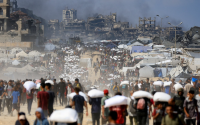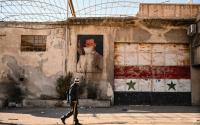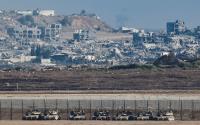Haifa ZanganaSeptember 17, 2002
I am an Iraqi British woman (half-Kurdish, half-Arab). I have lived in Britain since 1976. I can't go back to Iraq because, like many Iraqis, I was imprisoned and tortured. When I was released I was haunted by human howls of pain and memories of the dead.
Once in London, I could hardly believe I was safe in a democratic country. The day that I first exercised my right to vote was one of the happiest of my life. On election day 1979, I was up at 5am. I was the first to vote that day. I voted Labour. The Conservatives won.
The massacre of Halabja in 1988 went unnoticed here. Iraq was then the darling of the west. Iraq fought the west's war with Iran, to protect their interests and ensure a free market for oil. But this was Mrs Thatcher's government, which supported friendly dictators and normalised relations with military regimes.
In 1990, the Iraqi regime occupied Kuwait, and the US and UK decided Saddam had breached his contract of employment. In January 1991, hell was unleashed against the Iraqi people. The bombing lasted 43 days, destroyed many civilian targets and massacred tens of thousands of defenceless conscripts. Iraqis were shocked and confused: it seemed bizarre to punish them for the crimes of their persecutors.
Confusion turned to numbness when people discovered they were to be subject to one of the most comprehensive campaigns of economic sanctions in modern history. On December 6 1995, I sent an A4 padded envelope to my nieces and nephews in Mosul. It contained one pencil case, three erasers, three sharpeners, six fountain pens, two markers, one glue-stick and two Biros. It was marked "gift for children". The envelope was returned, stamped: "Due to international sanctions against Iraq, we are not able to forward your packet." But that was under John Major.
In 1997, the Labour party was at last elected, and Robin Cook declared the government's foreign policy to be "ethical". I applauded. But what has the restoration of hope brought? Continuing sanctions, for a start, which has meant starvation, death and intellectual stagnation. The bombing of Iraq has never stopped either. The USAF and RAF have been bombing civilians almost daily since December 1998; 144 civilians were killed in raids in 1999 alone. For the rest, life in Iraq goes on, as hard as ever.
Here are some paragraphs from two personal letters. The first, from a relative: "We women spend most of our time doing what our grandmothers used to do: we are staying home, sieving flour, baking bread, preparing and storing tomato puree and raising chickens."
The next, from a friend: "Let me share a laugh with you. As Selma, my wife, was being wheeled out of the operating theatre, the doctor handed me two things: a long prescription and, what else, do you think? Selma's uterus! I had to go find the medicine as soon as possible, and also to take the uterus to a private lab for a biopsy. It was the start of a 20-hour madman's journey around Baghdad."
So how do I now find myself standing by Iraq's dictatorial regime, while Tony Blair presents himself as the defender of both democracy and the Iraqi people? For decades, it was the other way around. Iraqis were not only resisting the oppressive regime, they were sacrificing their lives for change long before the occupation of Kuwait. They appealed for help from western governments. Their request was: stop supplying the Ba'ath regime with weapons. Nobody listened.
It's 2001: election time again. I hesitated, but still voted Labour. What choice did I have? Now the US is pushing for a massive assault on Iraq, and Blair is one of the few leaders willing to offer troops. Can it be true that the man I voted for is now preparing to "liberate" Iraq, in the same way he liberated Afghanistan, by ensuring the death of thousands of civilians? Is it true that he is relying on the Iraqi National Congress, a group set up in the early 90s with CIA help, and now funded by the State Department? Does he know that they are loathed by most Iraqis?
You are "either with us or against us", they say. As an Iraqi that means choosing between war and the dictator. To be on the side of the oppressed does not mean we are unaware of the complexity of the situation. To campaign for the lifting of sanctions, for an end to the paralysing bombardment and daily threat of war is to stand by the Iraqi people; it is that policy which will help them to change the oppressive regime. Any change should be initiated from within Iraq, not imposed by Bush or Blair.
When I hear Tony Blair speak on Iraq, I am reminded of my old landlady, who asked me, politely, in the late 1970s, about home. I explained a little about the government there and how it doesn't give a damn about people. She listened attentively then, in a nice, gentle way, said: "Next time, don't vote for him dear."
·Haifa Zangana is a novelist and painter.






